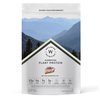‘Superfoods’ - the term that will rapidly catch your attention when used in the packaging of a product or the headline of an article. But what’s the deal with the growing popularity of superfoods? How super are they? Do they possess the ability to supercharge a plant protein powder that already promises so many health benefits? Let’s find out!
Superfoods, a term coined to describe foods that are exceptionally nutrient-dense and offer a wide array of health benefits, have experienced a surge in popularity in recent years. With their remarkable nutritional profiles and potential to support overall well-being, it is no wonder that superfoods have captured the attention and interest of health-conscious individuals worldwide. They are known for their exceptional concentrations of vitamins, minerals, antioxidants, and phytochemicals. These powerful compounds contribute to their reputation as nutritional powerhouses. Whether it's the antioxidant-rich berries, the omega-3 fatty acid-packed chia seeds, or the protein-packed quinoa, superfoods are celebrated for providing a substantial dose of essential nutrients in a single serving.
Here are a Few Reasons why Superfoods are Gaining Popularity among the Masses:
1. Enhanced Nutritional Profile
We’re all increasingly seeking foods that provide a concentrated dose of essential nutrients, and superfoods fit the bill perfectly. Each one of them is power-packed with vitamins, minerals, antioxidants, and phytochemicals.
2. Disease Prevention.
Many superfoods have been linked to reducing the risk of chronic diseases such as heart disease, cancer, and diabetes. Their high antioxidant content helps combat inflammation, neutralize harmful free radicals, and support a healthy immune system. The desire for preventive health measures has fueled the popularity of superfoods as we strive to proactively protect our well-being.
3. Improved Digestive Health.
Some superfoods, like chia seeds, flaxseeds, or psyllium husk, are excellent sources of dietary fiber. Fiber plays a crucial role in maintaining digestive health, promoting regular bowel movements, and supporting a healthy gut microbiome. Incorporating fiber-rich superfoods into your protein powder can aid digestion and contribute to overall gut health.
4. Energy Boost
Superfoods like spirulina, or matcha powder are known for their energizing properties. They may provide a natural and sustained energy boost, which can be especially beneficial before or after workouts. Including these superfoods in your vegan protein powder can help support an active lifestyle and optimize performance.
4. Convenience and Accessibility.
Superfoods are available in various forms, including powders, capsules, and whole foods. This accessibility allows individuals to incorporate them into their diets easily. Additionally, the widespread availability of superfoods in grocery stores, health food shops, and online platforms has made them more accessible to a broader audience.
5. Plant-Based and Alternative Diet.
Plant-based and alternative diets, including veganism and vegetarianism, are also gaining popularity, which has created a demand for nutrient-rich options. Superfoods offer a natural and potent source of plant-based nutrition, making them an appealing choice for those seeking to enhance their diet with sustainable and cruelty-free alternatives.
How Does Vegan Protein Powder Fit In?
The concern most vegans and vegetarians may have is that plant-based protein sources typically lack one or more essential amino acids, which are the building blocks of protein that the body cannot produce on its own. This is especially true for single-source plant proteins like rice or pea protein.
When it comes to meeting your protein needs, vegan protein powders are a game-changer. These powders are specifically designed to integrate several plant protein sources, resulting in a full amino acid profile that matches that of their animal-based competitors. Many times, they also contain digestive enzymes along with added superfoods for better digestion and absorption in the body. If you’re someone who regularly works out or is struggling to meet your daily protein intake, a plant protein powder is a must-have in your pantry.
The Marvelous Benefits of Superfoods in Protein Powders
Superfoods, known for their exceptional nutrient density, provide an extra boost of health-enhancing compounds that can elevate the nutritional profile of a protein powder. Superfoods, as we know, are packed with vitamins, minerals, antioxidants, and phytochemicals. When incorporated into protein powders, they provide an additional dose of these essential nutrients, promoting overall wellness and vitality.
The abundance of antioxidants in superfoods helps combat oxidative stress and reduce inflammation, supporting the body's immune system and protecting against chronic diseases. Furthermore, superfoods in protein powders contribute to enhanced energy levels and improved athletic performance. They often contain natural sources of plant-based proteins, such as spirulina, which provide amino acids for muscle repair and growth.
Superfood protein powder uses include muscle recovery, but they’re also highly useful in aiding muscle building, enhancing endurance, and promoting better exercise performance. Adequate, good-quality protein intake also ensures that it slows down aging, regulates your metabolism, and improves your digestion. The addition of superfoods also enhances the digestive properties of a protein powder. Superfoods like chia seeds, goji berries, or acerola cherries are rich in dietary fiber and antioxidants, promoting healthy digestion, boosting the immune system, and supporting gut health.
Wrapping Up
The incorporation of superfoods in protein powders amplifies their nutritional value, promoting optimal health and well-being. From their antioxidant power to their muscle-supporting properties and digestive benefits, superfoods contribute marvelously to the already impressive benefits of protein powders, providing a convenient and effective means of nourishing the body and supporting an active lifestyle.
—
References:
https://www.hsph.harvard.edu/nutritionsource/superfoods/
https://www.ncbi.nlm.nih.gov/pmc/articles/PMC6994964/
https://www.foodandnutritionjournal.org/volume6number3/superfoodsrecent-data-on-their-rolein-the-prevention-of-diseases/
https://www.ncbi.nlm.nih.gov/pmc/articles/PMC8801482/
https://www.ncbi.nlm.nih.gov/pmc/articles/PMC8628624/





























